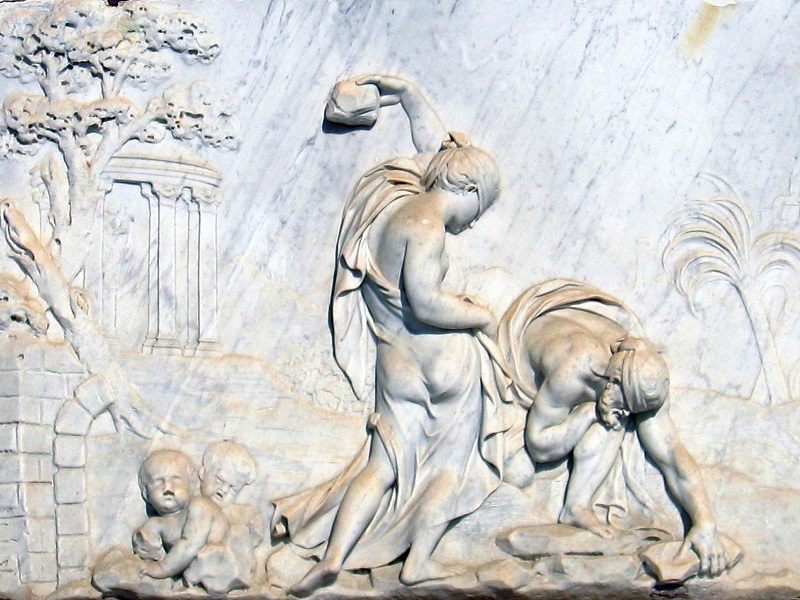Deucalion
GO TO:
In Greek mythology, Deucalion (Ancient Greek: Δευκαλίων) was the son of Prometheus; ancient sources name his mother as Clymene, Hesione, or Pronoia. He is closely connected with the flood myth in Greek mythology.
Family
Of Deucalion's birth, the Argonautica (from the 3rd century BC) states:
There [in Achaea, i.e. Greece] is a land encircled by lofty mountains, rich in sheep and in pasture, where Prometheus, son of Iapetus, begat goodly Deucalion, who first founded cities and reared temples to the immortal gods, and first ruled over men. This land the neighbours who dwell around call Haemonia [i.e. Thessaly].
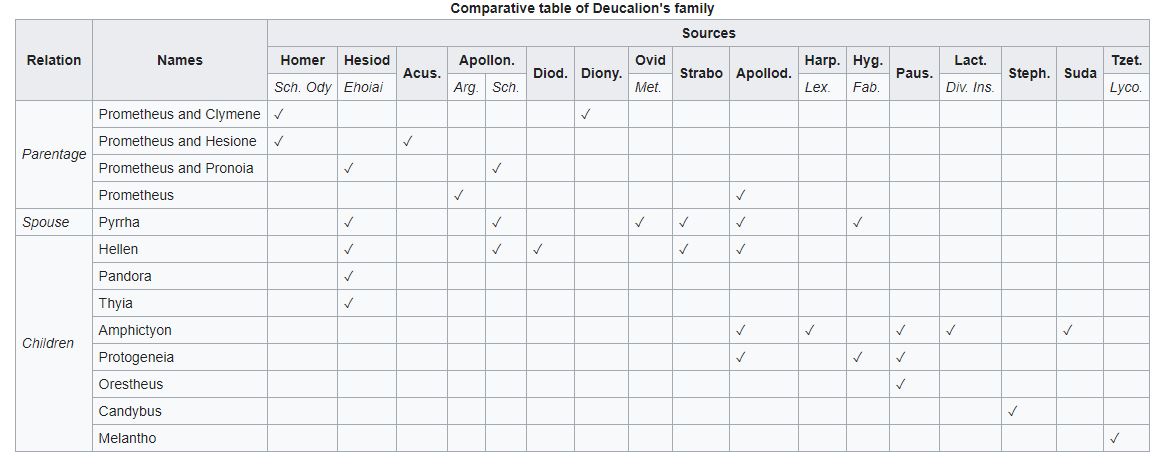
Deucalion and Pyrrha had at least two children, Hellen and Protogenea, and possibly a third, Amphictyon (who is autochthonous in other traditions).
Their children as apparently named in one of the oldest texts, Catalogue of Women, include daughters Pandora and Thyia, and at least one son, Hellen. Their descendants were said to have dwelt in Thessaly. One corrupt fragment might make Deucalion the son of Prometheus and Pronoea.
In some accounts, Deucalion's other children were Melantho, mother of Delphus by Poseidon and Candybus who gave his name to the town of Candyba in Lycia.
Mythology
Deluge accounts
Overall, the flood in the time of Deucalion was caused by the anger of Zeus, ignited by the hubris of the Pelasgians. So Zeus decided to put an end to the Bronze Age. According to this story, Lycaon, the king of Arcadia, had sacrificed a boy to Zeus, who was appalled by this savage offering. Zeus
Deucalion and Pyrrha lived in the Bronze Age of Man, the third age of man after the Gold and Silver Ages. It was a troubled age, for it was the age of man when the world’s evil had been released, after Pandora had looked inside her wedding gift.
The population increased and impiety and wickedness overtook man.
The final straw for Zeus was said to have been the actions of King Lycaon, for the Arcadian king had killed and served up one of his own sons as a meal, in order that the powers of Zeus could be tested. Lycaon and his remaining sons were turned into wolves by Zeus, but the supreme god also decided that it was time for the Bronze Age to come to an end.
Zeus decided that the manner of the extinction of man would come in the form of a great flood (you should know by now from where the Bible got its story about Noah etc).
Deucalion was warned about the plans of Zeus by his father Prometheus; for Prometheus was the Titan of Foresight. Thus, Deucalion and Pyrrha constructed a ship, or giant chest, and provisioned it with food and water.
When Zeus decided the moment was right, Zeus shut away the North Wind, Boreas, and let Notus, the South Wind, bring forth rain; the goddess Iris feeding the rain clouds with water. On the earth, the Potamoi were given free rein to flood the land, breaking their banks in numerous places.
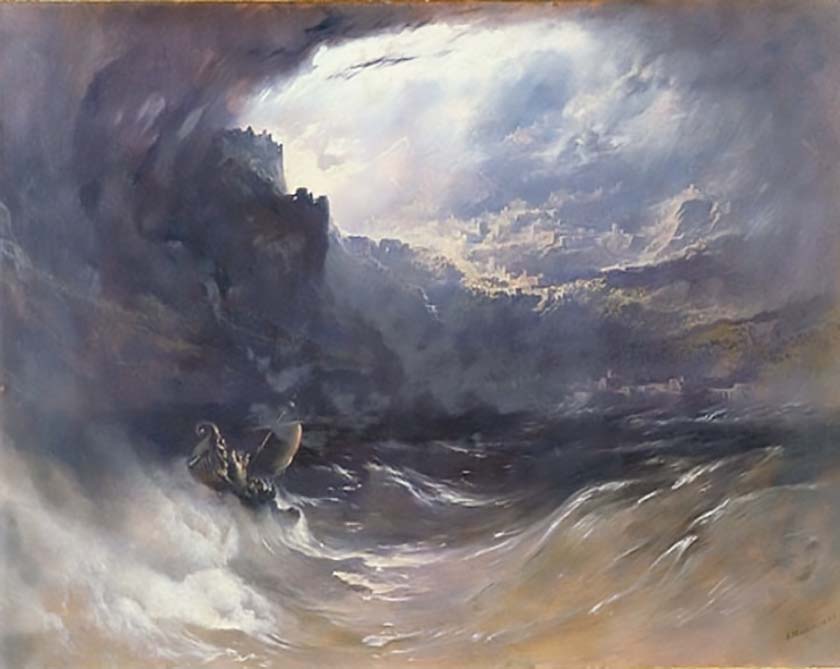
Water levels rose, and soon the whole world was covered in water, and man was virtually wiped out. At the same time, animals and birds also died, for there was nowhere for them to find sanctuary either, and only the sea life flourished.
Deucalion and Pyrrha though survived, for as the water levels rose, they boarded their ship and floated away from Thessaly.
For some time, possibly nine days and nine nights, Deucalion and Pyrrha floated in their ship, and whilst Zeus observed the survivors, the god decided not to do anything about the pair who were avoiding his retribution, for he perceived that Deucalion and Pyrrha were pious and pure of heart.
Eventually, Zeus stopped the rainfall, and the Potamoi returned to their original channels, and slowly the water began to recede. As the water retreated the ship of Deucalion and Pyrrha came to rest upon Mount Parnassus
The waters continued to recede, and soon the earth was back to its previous state, and as the water receded new flora and fauna burst into life.
Deucalion and Pyrrha offered up prayers to Zeus, thankful for their delivery for harm, but finding themselves alone on the earth, they sought guidance on what to do next.
Deucalion and Pyrrha visited the shrine of Themis, and prayed to the goddess of law and order. Themis responded to their prayers, and commanded Deucalion and Pyrrha to leave the sanctuary, and as they walked away they were to cover their heads and throw the bones of their mother over their shoulders.
Now the meaning of the words of Themis was not immediately clear, but eventually Deucalion and Pyrrha came to realise that the bones of their mother were actually the stones of Gaia, Mother Earth. Thus, it was the stones that were thrown by Deucalion and Pyrrha, and from the stones thrown by Deucalion came men, and from the stones thrown by Pyrrha came women.
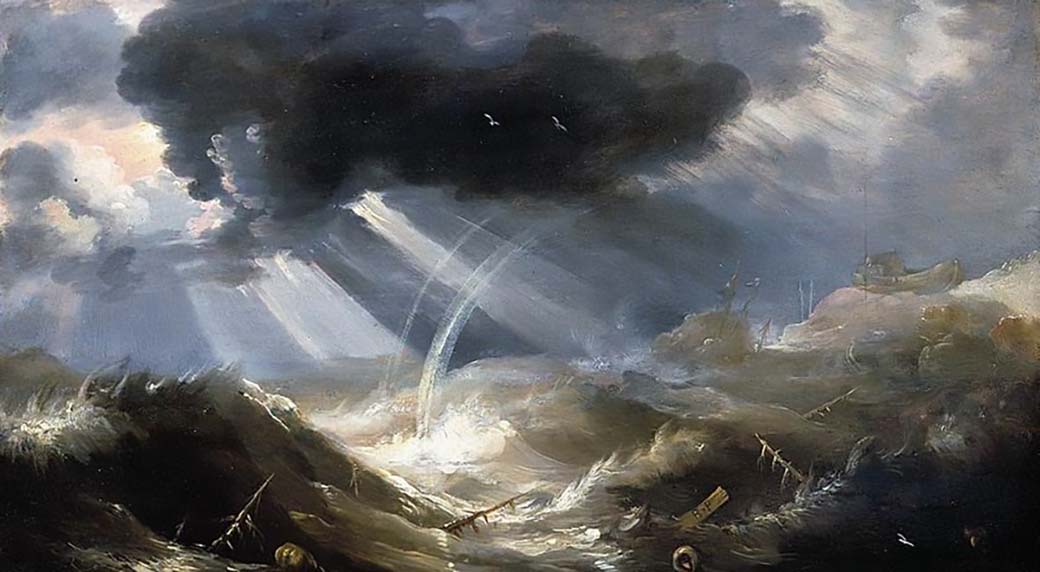
Other accounts
The fullest accounts are provided in Ovid's Metamorphoses (8 AD) and in the Library of Pseudo-Apollodorus. Deucalion, who reigned over the region of Phthia, had been forewarned of the flood by his father, Prometheus. Deucalion was to build a chest and provision it carefully (no animals are rescued in this version of the Flood myth), so that when the waters receded after nine days, he and his wife Pyrrha, daughter of Epimetheus, were the one surviving pair of humans. Their chest touched solid ground on Mount Parnassus, or Mount Etna in Sicily, or Mount Athos in Chalkidiki, or Mount Othrys in Thessaly.
The 2nd-century AD writer Lucian gave an account of the Greek Deucalion in De Dea Syria that seems to refer more to the Near Eastern flood legends: in his version, Deucalion (whom he also calls Sisythus) took his children, their wives, and pairs of animals with him on the ark, and later built a great temple in Manbij (northern Syria), on the site of the chasm that received all the waters; he further describes how pilgrims brought vessels of sea water to this place twice a year, from as far as Arabia and Mesopotamia, to commemorate this event.
Variant stories
On the other hand, Dionysius of Halicarnassus stated his parents to be Prometheus and Clymene, daughter of Oceanus and mentions nothing about a flood, but instead names him as commander of those from Parnassus who drove the "sixth generation" of Pelasgians from Thessaly.
One of the earliest Greek historians, Hecataeus of Miletus, was said to have written a book about Deucalion, but it no longer survives. The only extant fragment of his to mention Deucalion does not mention the flood either, but names him as the father of Orestheus, king of Aetolia. The much later geographer Pausanias, following on this tradition, names Deucalion as a king of Ozolian Locris and father of Orestheus.
Plutarch mentions a legend that Deucalion and Pyrrha had settled in Dodona, Epirus; while Strabo asserts that they lived at Cynus, and that her grave is still to be found there, while his may be seen at Athens; he also mentions a pair of Aegean islands named after the couple.
Deucalionids - The Children of Deucalion
Deucalion and Pyrrha also had children born in a more conventional way.
Three sons were born to Pyrrha, Hellen, the ancestor of the Hellenes people, Amphictyon, a future king of Athens, and Orestheus, a king of the Locrians.
Deucalion and Pyrrha also had three daughters, Pandora, Protogenia and Thyla.
All three of the daughters of Deucalion would become lovers of Zeus; and as a result, Pandora gave birth to Latinus and Graecus, the eponyms of Latin and Greek peoples; Protogenia, was mother to Aethilus the first king of Elis, Opus and Aetolus; and Thyla was mother of Magnes and Macedon, the eponyms of Magnesia and Macedonia respectively.
Combining all sources, the descendants we get are:
Children: Hellen, Amphictyon, Orestheus, Candybus, Protogeneia, Pandora II, Thyia and Melantho.
Grandsons: Aeolus, Dorus, Xuthus, Aetolus, Physcus, Aethlius, Graecus, Makednos, Magnes and Delphus.
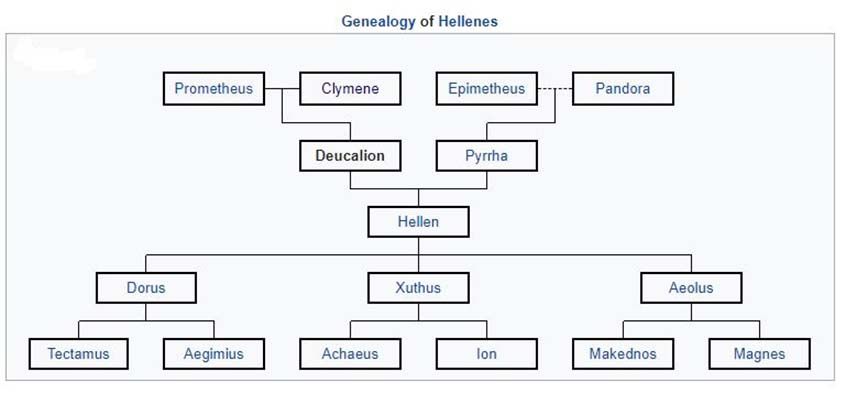
More Survivors:
In the myth of Deucalion and Pyrrha, husband and wife were the sole survivors of the Deluge, but in other stories from Greek mythology, other survivors are also mentioned.
Megarus, a son of Zeus, was said to have found sanctuary on top of Mount Gerania, when guided by the flight of some cranes. Megarus would subsequently become ancestor of the Megarians. Similarly, Dardanus was said to have survived to become ancestor of the Dardanians (Trojans) in Anatolia.
Deucalion and Pyrrha might not have even been the only survivors upon Mount Parnassus, for it was also said that the people of Delphi were guided to safety upon the mountain by the howling of wolves.
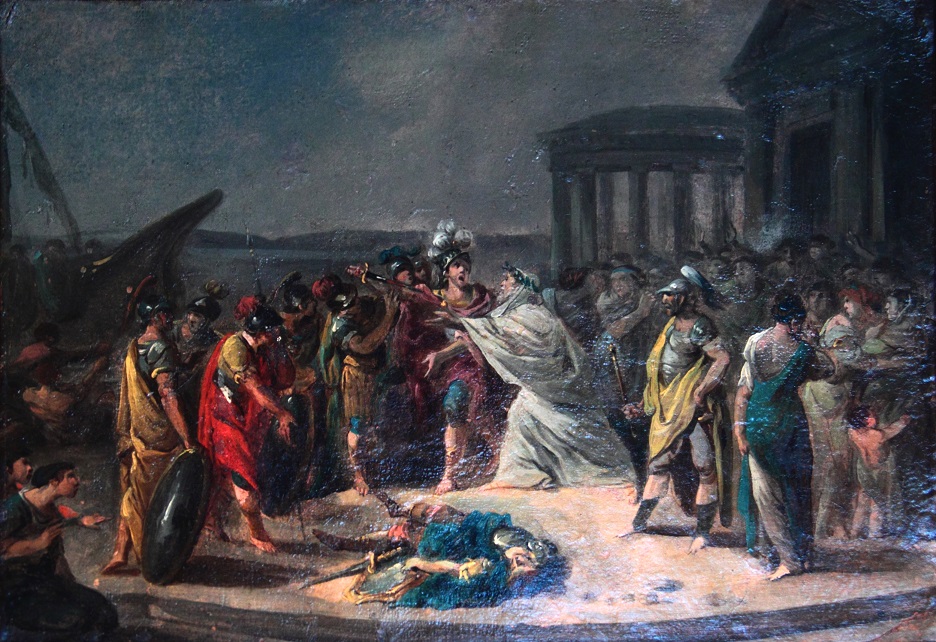
Deucalion of Crete
In Greek mythology, Deucalion or Deukalion (Ancient Greek: Δευκαλίων τῆς Κρήτης or Δευκαλίων ο Κρης), was a king of Crete. He was counted among the Argonauts and the Calydonian Hunters.
Deucalion was the eldest son of Minos either by Pasiphae or Crete and thus grandson of Zeus.
He was the brother of Acacallis, Ariadne, Androgeus, Xenodice, Phaedra, Glaucus and Catreus. By Cleopatra, Deucalion fathered Idomeneus who succeeded him and led the kingdom into the Trojan War. He was also the father of Crete and of an illegitimate son Molus.
In Diodorus' account, Deucalion and Molus were brothers and their sons Idomeneus and Meriones led the Cretans to Troy.
"Minos’ sons, they say, were Deucalion and Molus, and to Deucalion was born Idomeneus and to Molus was born Meriones. These two joined with Agamemnon in the expedition against Ilium with ninety ships..." (Diodorus Siculus, Library of History 4.62.1)
There are two distinct versions told of the Deucalion myth told about in ancient sources.
A tale tells of Deucalion being killed by Theseus, after the Athenian had killed the Minotaur in the Labyrinth. In this tale, when Theseus followed the Golden Thread out of the maze he encountered Deucalion and a force of Cretans, and killed them all.
In this version Catreus would succeed Minos as King of Crete, and then Idomeneus succeeded his uncle in the time of the Trojan War.
Another version of the Deucalion myth tells of a longer life for the son of Minos; one where he is not killed by Theseus.
After the death of Minos, Deucalion became king, an it was said that Deucalion arranged the marriage of his sister, Phaedra, to Theseus, ending hostilities between Athens and Crete.
Some also tell of Deucalion being both one of the Argonauts and also a hunter of the Calydonian Boar, although his name doesn’t appear in the best known sources about Jason and the Argo.
King Deucalion would be succeeded as King of Crete by his son, Idomeneus, although this version of the Deucalion myth doesn’t explain Menelaus’ absence from Sparta when Helen was taken by Paris, for it Menelaus was normally said to be at the funeral of Catreus.
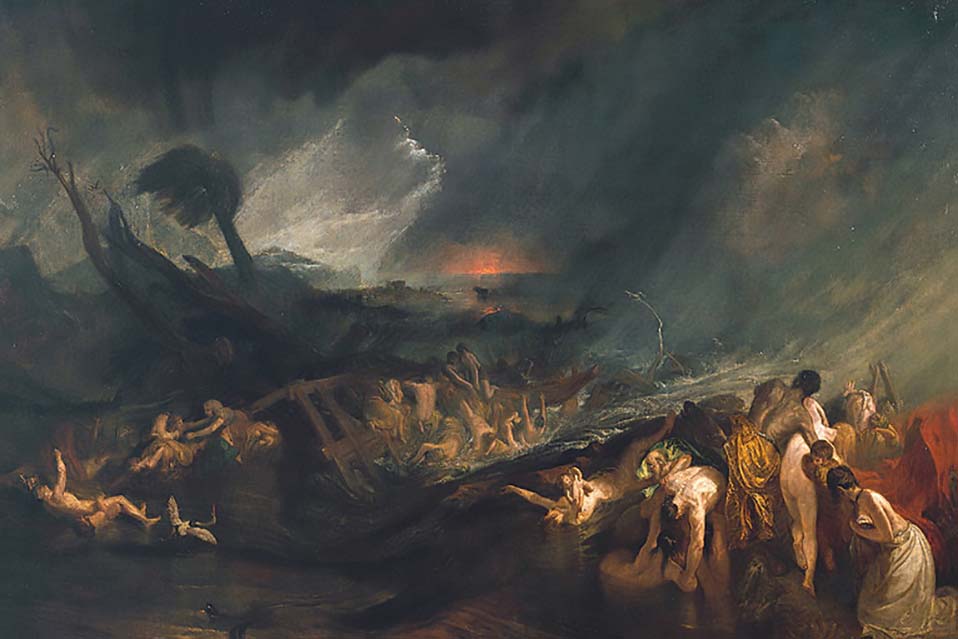
Sources
Hesiod, Catalogue of Women fragments 2–7 and 234 (7th or 6th century BC)
Hecataeus of Miletus, frag. 341 (500 BC)
Pindar, Olympian Odes 9 (466 BC)
Plato, "Timaeus" 22B, "Critias" 112A (4th century BC)
Apollonius of Rhodes, Argonautica 3.1086 (3rd century BC)
Virgil, Georgics 1.62 (29 BC)
Gaius Julius Hyginus, Fabulae 153; Poeticon astronomicon 2.29 (c. 20 BC)
Dionysius of Halicarnassus, Roman Antiquities 1.17.3 (c. 15 BC)
Ovid, Metamorphoses, 1.318ff.; 7.356 (c. 8 AD)
Strabo, Geographica, 9.4 (c. 23 AD)
Bibliotheca 1.7.2 (c. 1st century AD?)
Plutarch, Life of Pyrrhus, 1 (75 AD)
Lucian, De Dea Syria 12, 13, 28, 33 (2nd century AD)
Pausanias, Description of Greece 10.38.1 (2nd century AD)
Nonnus, Dionysiaca 3.211; 6.367 (c. 500 AD)
Hyginus, Fabulae 14.4
Hyginus, Fabulae 173
Tzetzes, Homeric Allegories Prologue 587
Tzetzes on Lycophron, 431
Pseudo-Apollodorus, Bibliotheca, Book 3.3.1 with an English Translation by Sir James George Frazer, F.B.A., F.R.S. in 2 Volumes. Cambridge, MA, Harvard University Press; London, William Heinemann Ltd. 1921.
Diodorus Siculus, Library of History 4.62.1
Plutarch. Life of Theseus, 19.5-6
"Wikipedia"
"Greek Legends and Myths"


